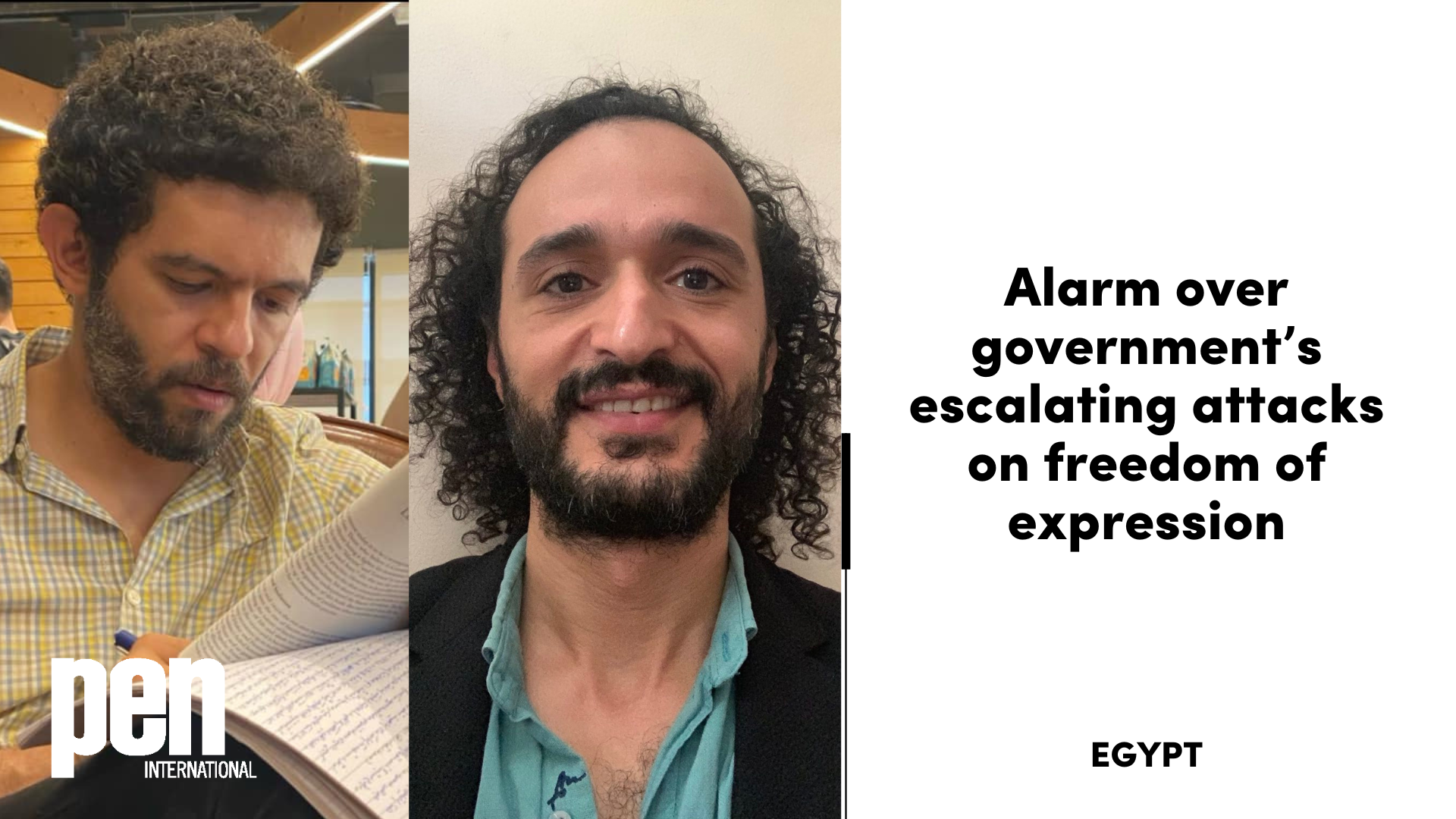Egypt: Alarm over government’s escalating attacks on freedom of expression
Photo: Ashraf Omar (left) courtesy of Ashraf Omar’s family, Ahmed Douma (right) courtesy of Ahmed Douma
‘We are gravely concerned by the escalating attacks on freedom of expression in Egypt in recent weeks. Arresting and assaulting Ashraf Omar and intimidating El-Maraya publishing house for their work are appalling acts. The use of smear campaigns to threaten Ahmed Douma’s safety is completely unacceptable. Every time the government claims to be open to a national dialogue with its critics, we see more attacks on freedom of expression. We call for an end to the systematic crackdown on freedom of expression in Egypt,’ said Burhan Sonmez, President of PEN International.
9 August 2024: PEN International condemns the Egyptian authorities escalating crackdown on freedom of expression in recent weeks, with examples including the intimidation of El-Maraya publishing house, arresting cartoonists and translator Ashraf Omar, and using incitement and smear campaigns against poet Ahmed Douma. The organisation calls for the immediate and unconditional release of Ashraf Omar and the return of all his confiscated work and belongings, and ending all intimidation against El-Maraya publishing house and the incitement and threats against Egyptian poet Ahmed Douma.
In recent weeks, Egyptian authorities have intensified their crackdown on freedom of expression despite the government's claim of continuing sessions of the National Dialogue, which President Al-Sisi called for in 2022 as a space to discuss the country's future and listen to the government's critics. In mid-July, poet and activist Ahmed Douma faced an online smear campaign after pro-government religious figures deemed parts of his poetry collection Curly as ‘an attack on the divine self and blatant and explicit blasphemy’. Labelling creative work, including poetry, as blasphemous places the creator of such work at risk of assault and imprisonment, which could have grave consequences for Douma and represent a risk to his physical safety and freedom.
Although Douma was released in August 2023 following a presidential pardon after serving over a decade in prison, he remains under a travel ban, unable to obtain official documents, including his passport, and unable to use his bank account. He has reported that his emails and social media accounts have been hacked several times since his release, and he continues to receive threats of imprisonment from security agents for his writings and activism following his release. In January 2024, Douma was subject to another smear campaign by pro-government media figures due to his activism against the war on Gaza, including his criticism of the Egyptian authorities' lack of response to the siege on Gaza.
On 22 July, security forces stormed the house of Egyptian cartoonist and translator Ashraf Omar, confiscated his personal belongings, blindfolded and took him to an unidentified location. His whereabouts were unknown, and he could not communicate with his family or lawyer for more than two days. On 24 July, he appeared before the Supreme State Security Persecution (SSSP) to face bogus charges, including ‘dissemination of false news’, ‘misusing the internet’, and ‘membership of a terrorist group’. According to a statement by Omar’s family, Omar was physically assaulted during the arrest and subjected to intimidation, including the threat of being tortured by electric shocks, before appearing in front of the prosecutor. He was questioned about his work, including translations and cartoons, before the prosecutor ordered his pre-trial detention on 24 July. On 4 August, his lawyer demanded the prosecutor to investigate Omar’s allegations of torture and ill-treatment and documented the confiscated personal belongings, which the police failed to include in the case, including EGP 339,000 (£5,390) police took from his house. The prosecutor extended his detention to a further 15 days.
On 27 July, Egyptian police stormed EL-Maraya publishing house in Cairo, confiscating more than 200 books and the publishing house’s computers, and arrested an administrative staff member. According to El-Maraya’s lawyer, the prosecutor released the administrative staff member the next day, yet the investigation remains open. El-Maraya Publishing House has provided a valuable space for young and emerging writers and has supported independent cultural voices since its establishment in 2016. In its mission statement, El-Maraya highlights its aim to support and platform critical and progressive voices and challenge Egypt's state monopoly on cultural spaces.
Background
Since President al-Sisi seized power in 2014, the country's human rights situation has been deteriorating. However, since he decided to run for a second term in 2018, the country has slipped into an unprecedented human rights crisis. Egyptian authorities continue to systematically punish any public or perceived dissent and severely repress the rights to peaceful assembly, association and freedom of expression. Scores of journalists, human rights defenders, activists and bloggers have been arbitrarily arrested, detained for prolonged periods without trial, and faced trumped-up charges solely in relation to their work or critical views.
For more information, please contact Mina Thabet, Head of the MENA Region, at PEN International, email: [email protected]

